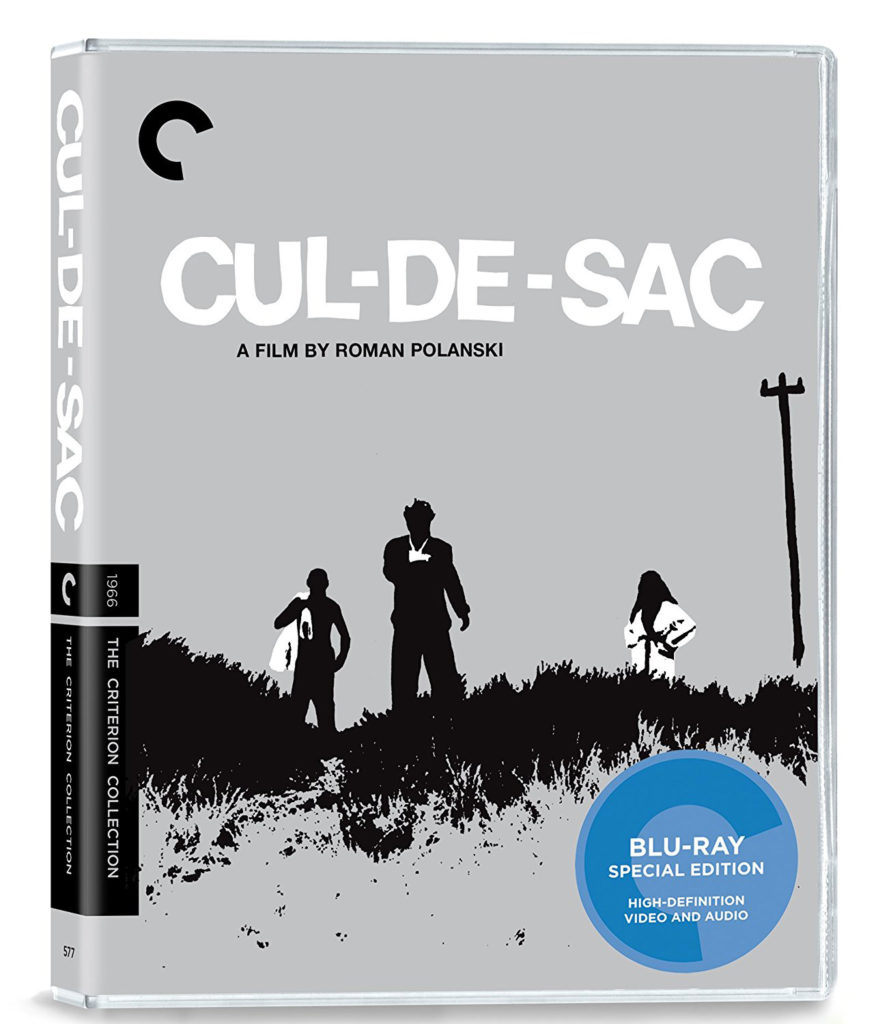#5 – Cul-de-Sac (1966)
Director: Roman Polanski
Writer: Roman Polanski, Gérard Brach
Cast: Donald Pleasence, Françoise Dorléac, Lionel Stander, Jack MacGowran
Cert: 15
Running time: 112mins
Year: 1966
Accolades:
1966 Berlin International Film Festival
Golden Bear
Contemporary review:
“Pleasence, in a role that requires him to run sideways most of the time with his head at a crooked angle, is hilarious and frightening as a man going mad, and the film has an eerie appeal.” –
Roger Ebert, Chicago Sun Times, 1967
Electric Shadows rating: 
Criterion Extras: 
What’s the story: Two gangsters, one badly wounded, arrive at remote castle on Holy Island in Northumberland, England. They encounter the bohemian couple living in the castle and a bizarre series of power games ensues.
What’s the verdict: Cul-de-Sac sits within the category “Easier to Admire than Like”. Roman Polanski’s third feature after 1962’s Knife in the Water and 1965’s Repulsion is loose and free-forming, echoing the avant garde sensibility of his debut short film Two Men and a Wardrobe.
Best described as The Desperate Hours meets Performance, the film concerns two gangsters (Stander and McGowran) who hole up in a castle on an island in the North of England after a job goes wrong. Living in the castle are prototype counter-culturals, artist George (Pleasence) and his French wife Teresa (Dorléac).
Chief mobster Richard (Stander) is awaiting orders from his boss, while his partner Albie (MacGowran) is bleeding out from a gunshot wound.
The plot synopsis and Saul Bass style opening credits suggest a traditional 1960s thriller. Yet, from the off, nothing is what it seems. The location of Holy Island is in Northumberland, but Repulsion cinematographer Gilbert Taylor’s camerawork makes it seem far more European.
This is a place where a road can quickly become submerged due to a treacherous tide, presenting the strikingly odd image of the bemused Albie sitting in a waterlogged Morris Minor.
A sense of uncanny half-recognition when watching Dorléac is because she was actually Catherine Deneuve’s sister (and tragically killed in a car accident in 1967). To viewers of a certain age, Stander will forever be the butler Max from gossamer 1980s show Hart to Hart, where ironically, he tended to the needs of a blissfully happy couple.
Back on the island, gulls and a Tiger Moth plane frequent the skies, but escape for the main players is impossible.
George and Teresa exist almost exclusively on eggs provided by the myriad chickens roaming the castle courtyard. In a subtle visual touch, George’s bald head suggests he is turning into an egg (all thanks to Pleasence, who shaved his dome against Polanski’s instructions).
Lacking is the rigour and structure seen in later Polanski films such as Death and the Maiden and Venus in Fur (both based on plays). The spirit of 1960s non-conformity has now evaporated, leaving Cul-de-Sac open to criticism that the games and shifting allegiances between George, Teresa and Richard ultimately amount to very little.
Yet, despite aging less well than Repulsion made a year before, the film (which picked up first prize at the Berlin Film Festival) has moments that grip the attention. A late in the film visit from bourgeois friends (including Jacqueline Bisset in her first credited role – billed as “Jackie”) revitalises the drama and with hindsight resembles a dry-run for Polanski’s 2011 Carnage (again based on a play).
Taylor’s photography (wonderfully captured on the Criterion Blu-ray) is never less than striking, shifting from bleached-out beach fronts to high contrast shots of the castle against cloudy British skies, to sweaty close-ups of the leads as escalating paranoia and madness takes hold.
Stander was apparently near impossible to work with, so presumably the on-screen antagonism between the leads is genuine. Pleasence and Dorléac convince as a couple unsuited to each other, yet unlikely to survive in normal society.
In no way a dead-end, but of primary interest in how it relates to later Polanski films.
Extras: Two Gangsters and an Island is a 25-minute 2003 short documentary produced by Blue Underground. Polanski, Taylor and producer Gene Gutowski recount the difficult shoot, actors’ squabbles, hostility from the locals and constant money worries, exacerbated by Polanski’s pushes for perfection.
Another fine extra running just under half an hour is an episode of the British TV series, The Movies entitled The Nomad. Focussing on Polanski’s work up to the then recently shot The Fearless Vampire Killers (here referred to as The Vampire Killers) it is a good insight into Polanski’s opinions at the time. The director is confident and witty in interview and the episode has lengthy excerpts from his award-winning shorts 2 Men and a Wardrobe and Mammals.
Theatrical trailers and a booklet featuring an essay by David Thompson (not included with review disc) round out the package.
[youtube id=”49v7QvjoPgQ”]
Rob Daniel
Twitter: rob_a_Daniel
Like this review? Try out The Electric Shadows Podcast available now for subscription on iTunes or here.





